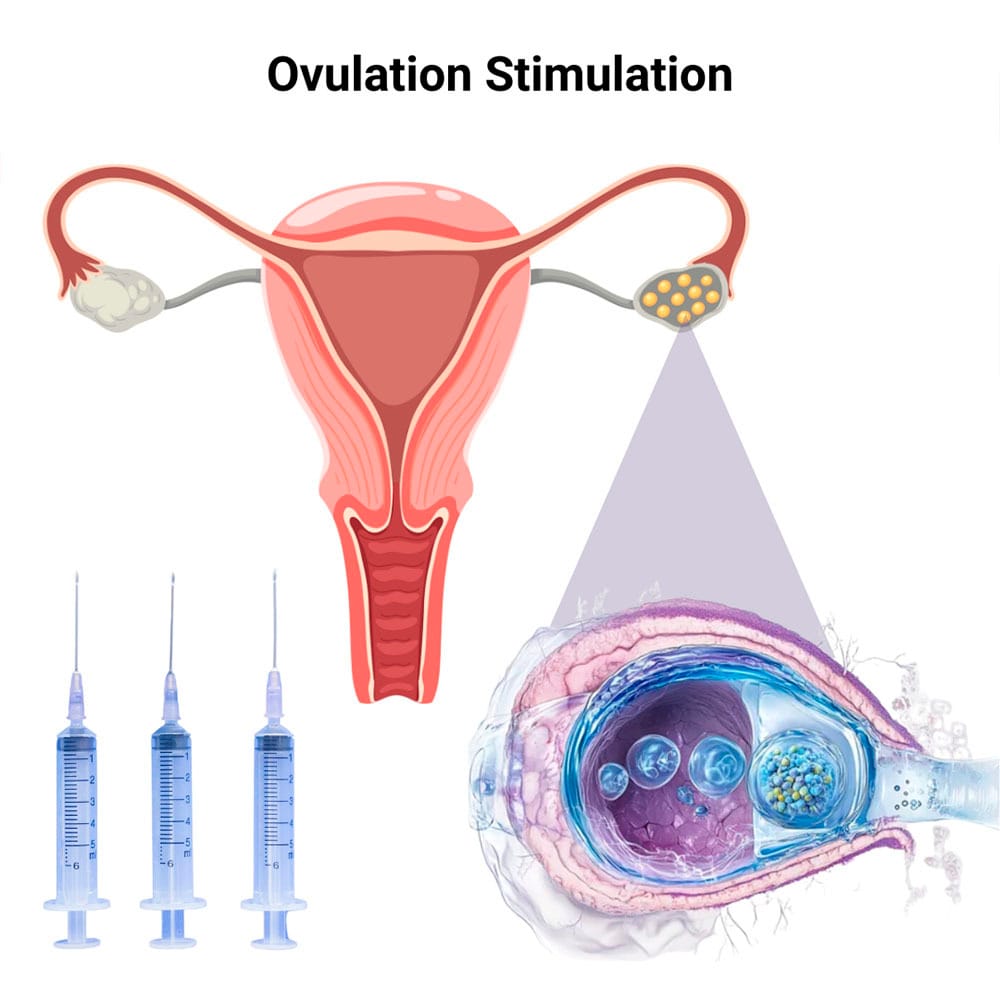What Is Ovulation Stimulation?
 During normal ovulation, the ovary releases a mature egg each month to prepare it to be fertilized. If your menstrual cycle is regular, normal ovulation happens about once every 28 days, but ovulation can range from 21 to 35 days. Ovulation stimulation, also called ovulation induction or ovarian stimulation, is a form of treatment in which hormones are used to stimulate this process.
During normal ovulation, the ovary releases a mature egg each month to prepare it to be fertilized. If your menstrual cycle is regular, normal ovulation happens about once every 28 days, but ovulation can range from 21 to 35 days. Ovulation stimulation, also called ovulation induction or ovarian stimulation, is a form of treatment in which hormones are used to stimulate this process.
If you’re looking for a Midtown NYC gynecology practice, your best choice is Cohen Medical Practice (CMP). Services provided include a full range of fertility services, including pregnancy testing and planning. These board certified gynecologists deliver an accurate diagnosis and treatment of conditions that affect the female reproductive system.
Who May Benefit from Ovulation Stimulation?
If your periods are irregular, ovulation may be unpredictable and may happen only once every 35 days. Problems with ovulation often are the underlying cause of problems with fertility.
Women who may benefit from ovulation stimulation include those who:
- Don’t ovulate on their own
- Have disorders that affect ovulation such as polycystic ovarian syndrome (PCOS), thyroid disorders, obesity or eating disorders
- Are undergoing fertility treatments
- Experience unexplained infertility
In vitro fertilization (IVF) is a procedure that involves combining a sperm and egg in a laboratory setting and then implanting the embryo back into the uterus. Ovulation stimulation may be done as part of IVF to increase the number of eggs reaching maturity.
How Is Ovarian Stimulation Accomplished?
If you’re struggling with infertility because of ovulation disorders, fertility drugs that trigger ovulation may be prescribed. Ovarian stimulation is done by using hormone-based medicine to regulate female hormones and improve the chance of ovulation and conception. Treatments have to be precisely timed and if there are any delays, the process has to be restarted.
Options include:
- Oral medications. When ovulation is abnormal, the first type of treatment is usually oral medication such as Clomiphene and letrozole. These medications stimulate the production of hormones that trigger the growth of eggs. They’re usually prescribed to be taken on days five to nine or days three to five of the menstrual cycle.
- Follow-up. At around day 10, your doctor does a transvaginal ultrasound to check for egg development, and bloodwork may also be ordered to evaluate hormone levels.
- Injectable medication. Your doctor may recommend injectable medication if taking oral medication isn’t successful. Injections are usually given for six to ten days starting with day three of your menstrual cycle and these injections may be combined with pills or patches. You may have bloodwork and ultrasounds several times during this process.
- Stimulating medicines. Gonadotropins such as follicle stimulating hormone (FSH) and luteinizing hormone may be used to stimulate the development of multiple eggs in an effort to maximize success with in vitro fertilization. FSH may be used in combination with human chorionic gonadotropin (HCG) to prepare follicles to mature.
In some women, fertility drugs are all that’s needed to overcome fertility problems. In other women, fertility drugs may be combined with other fertility treatments, such as IVF or intrauterine insemination (IUI). Your NYC gynecologist chooses the best medication to use based on a combination of factors such as your specific fertility challenge, your age, your overall health and the cost and availability of the medications.
Are There Risks or Side Effects from Ovulation Stimulation?
When injectable hormones are used to stimulate ovulation, there’s some risk of developing an exaggerated response called ovarian hyperstimulation syndrome (OHSS). In rare cases, it may develop in women taking oral fertility medications.
Symptoms of mild ovarian hyperstimulation syndrome include:
- Nausea
- Vomiting
- Diarrhea
- Abdominal bloating or discomfort
Symptoms of a mild case of OHSS usually go away in about a week. More serious cases may cause symptoms such as rapid weight gain, shortness of breath and severe abdominal pain. Dr. Cohen carefully monitors you while you’re taking fertility medications with regular ultrasounds and bloodwork, which greatly reduces the chances of developing OHSS.
Another risk to consider when having ovulation stimulation is that fertility medications can trigger the release of multiple eggs. If you become pregnant with more than one baby, you may have a high risk pregnancy including a higher risk of premature delivery.
What Other Steps Are Involved in IVF?
IVF is a form of assisted reproductive technology that may be effective for women with blocked fallopian tubes, irregular ovulation or conditions such as PCOS or endometriosis.
Steps involved in IVF include:
- Stims IVF. The first part of IVF is IVF stimulation, which is medication to stimulate multiple eggs to grow.
- Monitoring. Your CMP doctor monitors hormone levels with bloodwork and checks progress with ultrasounds.
- Egg retrieval. Eggs are retrieved in an outpatient procedure.
- Fertilization. Eggs are fertilized in a lab setting using sperm from your partner or from a donor.
- Embryo transfer. Embryos are implanted in your uterus.
Many women can achieve a successful pregnancy through ovulation stimulation, IVF or other forms of fertility treatment. To learn more about ovarian stimulation, artificial insemination or other options in fertility treatment, contact Cohen Medical Practice (CMP) today for a consultation.

